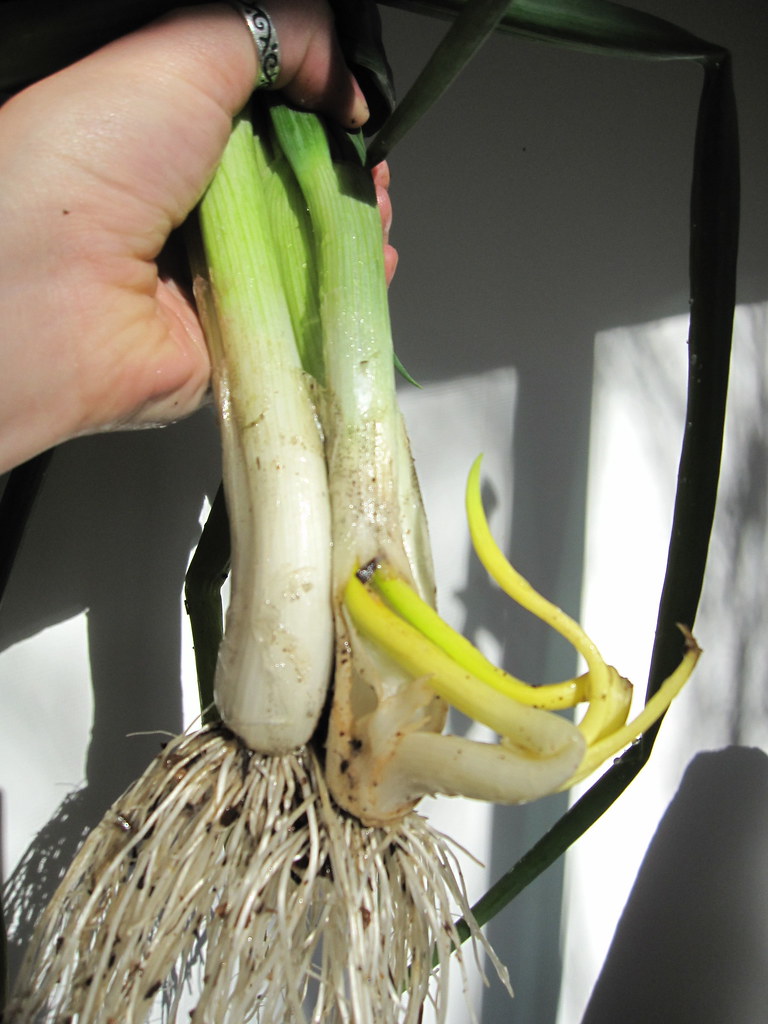This year i planted much earlier, in both September and again in January so i've been harvesting onions for several months. The greens have finally all fallen over and i've pulled some from certain beds and am leaving others to store in the ground. I was concerned our recent big rain might rot the ones left in the ground, but it's been hot and dry enough to keep them happily preserved.
 |
| Picked and curing in as shady and well ventilated an area as i could jerry rig. |
You can harvest onions at any point you choose. I have both multiplying onions and bulbing onions in my gardens. The multiplying onions are presently drying up after their Spring bloom, working on hardening their little bulbs that can be divided and transplanted in the fall. In Winter and Spring, the greens can be harvested like chives. The bulbing onions were planted from sets. I chose a red and white variety, both are sweet. I can't remember their varieties, but i really like them. I've gotten some very large specimens this year and am quite pleased. I plant my onion sets 2 inches apart and periodially harvest every other onion to facilitate good, big round bulbs. After these onions cure, i'll slip them into some panty hose separated by knots. But honestly: i use onions in everything i cook, so storage will really only be an issue when i have a garden large enough to plant a whole FIELD of onions, plus a crawl space in which to put said stored onions. For now i mostly eat them up pretty quickly.
Nutrition: i always tell my friends when they're feeling a little less than perky: "Saute up a big batch of garlic and onions! That will knock out your cold before it gets you! " They more often than not look at my with an expression of disdain. Well i know what's good for ME and haven't had a cold in over 5 years, thank you very much. Here's the breakdown:
Both Calorie Count and Nutrition Data give about the same results: Onions rock, they're high in vitamins and minerals essential for a healthy immune system, chock full of vitamin C to stave off the nasty germ monsters, but are high in sugar. Ain't it always so? The yummiest veggies sometimes have more sugar than you may have thought of.
I like to use that to my advantage: by adding sliced or diced onions to my healthy sautees, i can skip much of the oil and seasonings otherwise necessary. Their bodies contain a lot of liquid, so all you have to do is toss the onions in with the rest of your saute, add maybe a splash of stock, water, vinegar or wine, cover with a lid and let the onions do their magic.
Here's one last food for thought for you to mull over, courtesy of www.aggie-horticulture.tamu.edu:
Onions are high in energy and water content. They are low in calories, and have a generous amount of B6, B1, and Folic acid.
Onions contain chemicals which help fight the free radicals in our bodies. Free radicals cause disease and destruction to cells which are linked to at least 60 diseases.
To make onions milder, soak them in milk or pour boiling water over slices and let stand. Rinse with cold water.
When a person eats at least 1/2 a raw onion a day, their good type HDL cholesterol goes up an average of 30%. Onions increase circulation, lower blood pressure, and prevent blood clotting.
And one last tip, you ask? To prevent tearing up when cutting your onions: Breath in through the mouth, out through the nose. Those tears are actually coming from irritation in your SINUSES not your EYES. Also, start cutting at the top of the onion, leaving the root for last or not at all: most of the irritating juices come from the root end.
Here's to your health!






No comments:
Post a Comment
Thank you so much for your feedback, especially if you've cooked one of my recipes or tried one of my tips: let me know how it turned out!